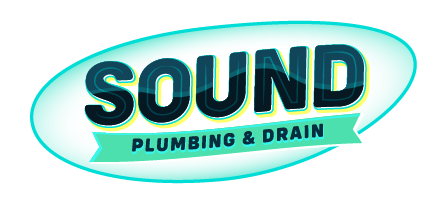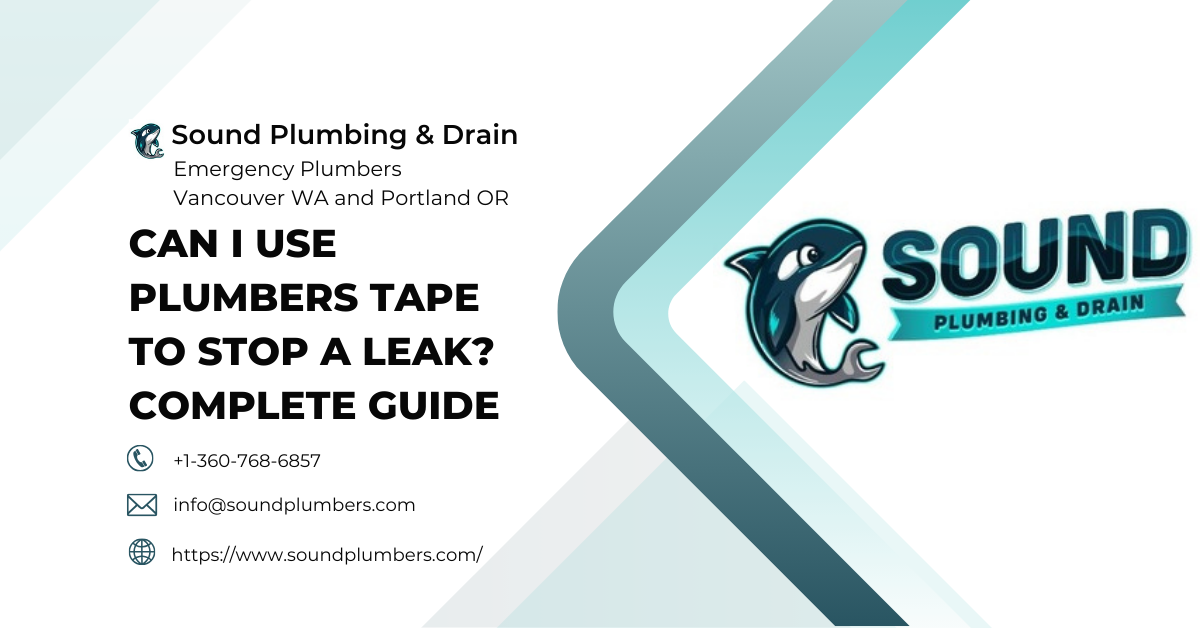Plumbers tape can temporarily stop a leak, but it depends on the type of leak and tape used. Pipe thread tape (Teflon tape) helps seal threaded pipe joints, preventing small leaks at the connection points. Silicone plumbers tape, also called self-fusing tape, can seal minor cracks by wrapping tightly around the pipe.
While plumbers tape is effective for minor leaks, it is not a permanent fix for damaged or burst pipes. If water continues to leak after applying the tape, or if the pipe is cracked, a professional plumber should be called to prevent further damage.
Want to know when plumbers tape is enough and when you need a plumber? Read on to find out.
Here's What We Have Covered In This Article
When to Use Pipe Thread Tape for Leaks
Pipe thread tape is effective for minor leaks at threaded connections, but it won’t fix every plumbing issue.
Use pipe thread tape when:
- You notice a small leak where two pipes connect.
- A faucet, showerhead, or hose connection is dripping.
- You are installing or replacing threaded pipes and want to prevent leaks.
Don’t use pipe thread tape when:
- The leak is coming from a crack or hole in the pipe.
- The pipe is severely corroded or damaged.
- The leak is large or persists even after applying the tape.
If a leak continues after using pipe thread tape, the problem may require professional repair or pipe replacement.
How to Apply Pipe Thread Tape Correctly
Applying pipe thread tape the right way ensures a leak-proof seal and a secure pipe connection. Follow these steps for best results:
Step 1: Turn Off the Water
Before starting, shut off the water supply to avoid leaks while working.
Step 2: Clean the Threads
Use a cloth or brush to remove any dirt, debris, or old tape from the threads. This helps the tape adhere properly.
Step 3: Wrap the Tape in the Right Direction
Hold the end of the tape against the threads and start wrapping in the same direction the pipe will be screwed in (typically clockwise). This prevents the tape from unraveling when tightening the connection.
Step 4: Apply the Right Amount of Tape
Wrap the tape around the threads 4 to 6 times for a snug fit. For gas pipes, use a thicker tape and wrap 6 to 8 times.
Step 5: Press the Tape Firmly
After wrapping, press the tape into the grooves of the threads with your fingers to ensure a tight seal.
Step 6: Screw the Pipe Back Together
Carefully screw the pipe into place. The tape will compress and create a watertight seal between the threads.
Step 7: Turn the Water Back On and Check for Leaks
Once everything is tightened, turn the water back on slowly and check if the leak has stopped.
If the leak persists, the pipe might need additional tape or a more permanent repair.
How Does Silicone Plumbers Tape Work?
Silicone plumbers tape, also known as self-fusing tape, is a flexible, rubber-like tape that bonds to itself rather than the pipe surface. Unlike pipe thread tape, it does not require threading and can be wrapped directly around cracks or small leaks.
As it stretches, the tape fuses together to create a tight, waterproof seal. This makes it a quick temporary fix for small pipe leaks until a proper repair can be made.
Best for sealing:
- Small cracks or pinhole leaks in pipes.
- Temporary repairs on rubber, plastic, or metal pipes.
- Hoses and fittings that cannot be easily replaced.
Not a long-term fix for:
- Large cracks or burst pipes.
- Pressurized gas or chemical lines.
- Permanent plumbing repairs.
Since silicone tape is heat-resistant and waterproof, it is useful for emergency plumbing fixes, but damaged pipes should still be inspected and repaired professionally.
When to Use Silicone Plumbers Tape for Leaks
Silicone plumbers tape is useful in emergencies when you need to stop a small leak quickly.
Use silicone tape when:
- A pipe has developed a small crack or pinhole.
- A leak is dripping but not gushing.
- You need a temporary fix before calling a plumber.
Avoid using silicone tape when:
- The pipe is cracked all the way through or severely damaged.
- The leak is under high pressure, causing water to spray out.
- The repair needs to last long-term.
While silicone tape can stop leaks for a short time, it should not be relied on as a permanent solution. A cracked pipe must be replaced to prevent further water damage.
How to Use Silicone Plumbers Tape
Applying silicone tape properly ensures it creates a strong seal and stops the leak temporarily.
Step 1: Turn Off the Water Supply
Shut off the main water valve to prevent further leaking while working.
Step 2: Dry and Clean the Area
Use a towel to dry the pipe completely. Silicone tape only bonds to itself, so the pipe does not need to be sticky or rough.
Step 3: Stretch the Tape as You Wrap It
Start wrapping the tape about 2 inches away from the leak. Stretch it tightly as you wrap, so it fuses together and seals the crack.
Step 4: Overlap Each Layer
Wrap the tape overlapping by at least half its width, continuing past the leak to ensure full coverage.
Step 5: Press and Secure the Tape
Once wrapped, press the tape down firmly so it self-bonds and forms a watertight barrier.
Step 6: Turn the Water Back On and Check the Leak
Slowly restore the water supply and inspect the repair. If the tape holds, it should stop the leak temporarily until a professional fix can be arranged.
If water is still leaking, the pipe may need immediate replacement.
Can Plumbers Tape Be a Permanent Fix?
Plumbers tape is not a permanent fix for leaks, but it can be a long-lasting solution in certain situations.
Pipe thread tape (Teflon tape) is designed for sealing threaded joints and can remain effective for years if applied correctly. However, it does not work on cracks, holes, or worn-out pipes.
Silicone plumbers tape provides a temporary fix for small leaks by bonding to itself and creating a waterproof seal. While it can hold up for a short time, it is not meant to last permanently. The pipe will eventually need professional repair or replacement to avoid future leaks and water damage.
If a leak persists even after applying plumbers tape, the problem is likely more serious and requires expert attention.
Plumbers Tape vs. Calling a Professional
Plumbers tape is a useful tool, but it is not always the right solution. Knowing when to use it and when to call a plumber can save time, money, and further damage.
Plumbers tape is enough when:
- Fixing minor leaks at threaded connections (e.g., showerheads, faucets, pipe joints).
- Preventing drips from loose fittings by creating a tighter seal.
- Temporarily stopping a small crack until professional repairs can be made.
A plumber is necessary when:
- The pipe is cracked, broken, or corroded.
- Water is gushing out rather than slowly dripping.
- The leak is coming from a soldered joint or welded pipe, where tape won’t work.
- The problem keeps coming back even after using tape.
Using plumbers tape when it isn’t enough can lead to worse damage and higher repair costs later. If in doubt, consult a professional.
Common Mistakes When Using Plumbers Tape
Using plumbers tape incorrectly can cause leaks to persist or even make the problem worse. Here are the most common mistakes and how to avoid them.
Wrapping in the Wrong Direction
- Tape should always be wrapped in the same direction as the pipe threads (usually clockwise). Wrapping it the wrong way causes it to unravel when tightening the connection.
Using Too Little Tape
- One or two wraps won’t create a proper seal. Wrap it 4–6 times around the threads for best results.
Using Too Much Tape
- Excess tape can prevent the pipe from screwing in properly and cause a loose connection. Stick to the recommended 4–6 wraps.
Applying Tape to the Wrong Areas
- Pipe thread tape only works on threaded connections. It won’t fix cracks or smooth pipe surfaces—for those, use silicone plumbers tape as a temporary solution.
Not Pressing the Tape Firmly
- After wrapping, press the tape into the threads to ensure a snug fit before screwing the pipes together.
Avoiding these mistakes helps plumbers tape work more effectively and prevents unnecessary leaks.
Signs That Plumbers Tape Won’t Work
Plumbers tape is not a one-size-fits-all solution. If you notice any of these issues, tape won’t be enough, and a proper repair is needed.
The Pipe is Cracked or Broken
- Plumbers tape can’t seal large cracks or broken sections of pipe. These need replacement or professional repair.
Water is Spraying Out Under Pressure
- If water is gushing or spraying, the leak is too severe for tape to hold.
The Leak Keeps Coming Back
- If you’ve applied tape multiple times and the leak keeps reappearing, the pipe may be too damaged to fix with tape.
The Pipe is Rusted or Corroded
- Rusted pipes often have deeper structural damage. Tape might slow the leak for a while, but the pipe will eventually fail completely.
The Leak is at a Soldered Joint
- Plumbers tape only works on threaded connections. If the leak is at a welded or soldered joint, the fix requires professional tools and expertise.
If any of these apply, don’t rely on tape—call a plumber to fix the issue properly before it gets worse.
Best Practices for Preventing Leaks in Pipes
Preventing leaks before they happen can save money, time, and potential water damage. Here are the best ways to keep your plumbing system in good condition.
Check for Loose Fittings Regularly
- Pipes and fixtures can loosen over time, leading to small leaks. Inspect and tighten connections every few months.
Use the Right Tape on Threaded Joints
- When installing new pipes or fixtures, always apply pipe thread tape correctly to prevent leaks before they start.
Avoid Over-Tightening Pipe Connections
- Over-tightening can crack fittings or strip threads, increasing the risk of leaks. Secure the connection firmly, but don’t force it.
Keep Drains Clear to Reduce Pressure Build-Up
- Clogs can increase pipe pressure, leading to leaks or burst pipes. Use drain strainers and avoid pouring grease, food scraps, or hair down the drain.
Insulate Pipes in Cold Weather
- Frozen pipes can crack and burst, causing major leaks. In winter, wrap exposed pipes in insulation or let faucets drip slightly to prevent freezing.
Fix Small Leaks Immediately
- Even a slow drip can turn into a bigger problem. If you notice damp spots, water stains, or mold, find the source of the leak and fix it right away.
Following these steps reduces the risk of leaks and keeps your plumbing system in good shape.
Frequently Asked Questions About Plumbers Tape
Can I use plumbers tape to stop water leaks?
Yes, but only in certain cases. Pipe thread tape is best for sealing threaded joints to prevent leaks at connection points. Silicone plumbers tape can temporarily seal small cracks in pipes, but it is not a permanent fix.
When should you not use plumbers tape?
Avoid using plumbers tape if:
– The pipe is cracked or broken—tape won’t hold.
– The leak is high-pressure, causing water to spray out.
– The leak is at a soldered or glued joint—tape only works on threaded connections.
– The pipe is corroded or rusted—replacement is the better solution.
Is plumbers tape a permanent fix?
No. Pipe thread tape can last years on properly sealed joints, but it won’t fix structural issues. Silicone tape is always temporary and should be replaced with a permanent repair as soon as possible.
How effective is plumbers tape?
Plumbers tape is highly effective for the right applications. Pipe thread tape prevents leaks in threaded joints when applied properly. Silicone tape can stop a small leak temporarily but won’t work for major damage.
When to Call a Plumber for a Leak
Not all leaks can be fixed with plumbers tape. Some require professional repair to prevent water damage, mold growth, and expensive plumbing issues. If you notice any of the following, it’s time to call a licensed plumber.
Call a plumber immediately if:
- Water is spraying or gushing from a pipe. This means the pipe is under high pressure, and tape won’t hold.
- The leak is coming from a cracked, corroded, or burst pipe. A pipe in poor condition needs replacement, not temporary fixes.
- The leak is near a welded, soldered, or glued joint. Plumbers tape only works on threaded connections, not permanently bonded joints.
- The leak is causing water damage to walls, ceilings, or floors. Ignoring it can lead to mold, rot, and structural damage.
- You’ve applied plumbers tape, but the leak keeps coming back. Persistent leaks usually indicate underlying plumbing issues that need expert attention.
If you’re experiencing any of these problems, Sound Plumbing & Drain is here to help. We operate as local plumbers in Vancouver, WA, and Portland, OR, offering 24/7 emergency service to ensure your plumbing system is secure.
We serve all nearby areas, including Hazel Dell, Salmon Creek, Orchards, Camas, Ridgefield, Felida, and Battle Ground in Vancouver, WA, as well as Beaverton, Gresham, Tigard, Lake Oswego, and Milwaukie in the Portland metro area.
Call us anytime at +1 360-768-6857 or email us at info@soundplumbers.com for fast and reliable plumbing repairs.
Find a Reliable Plumber Near You In Vancouver WA & Portland OR
When a leak is beyond DIY fixes, you need a trusted professional who can handle the job properly. Sound Plumbing & Drain provides expert plumbing services in Vancouver, WA, and Portland, OR, ensuring your home stays dry and damage-free.
Why Choose Sound Plumbing & Drain?
- 24/7 emergency service—because leaks don’t wait.
- Licensed and experienced plumbers who get the job done right.
- Fast response times in Vancouver, WA, and Portland, OR, including nearby areas like Hazel Dell, Camas, Beaverton, and Tigard.
- Honest pricing with no hidden fees.
If you’re dealing with a leak that plumbers tape won’t fix, don’t wait until the damage gets worse. Call Sound Plumbing & Drain today at +1 360-768-6857 or email info@soundplumbers.com to schedule a service.
Visit us at:
7720 NE Hwy 99 D, Vancouver, WA 98665, United States
We’re open 24/7—ready whenever you need us!
Useful Reading
For more information on leak detection and prevention, consider the following resources:
-
Detecting Water Leaks: The City of Vancouver, WA, provides guidance on identifying and addressing water leaks in residential and commercial properties.
-
2023 Drinking Water Quality Report: The City of Portland, OR, offers insights into the local water system and quality, which can help residents understand potential sources of leaks and the importance of maintenance.






